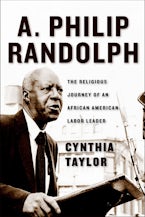A. Philip Randolph
The Religious Journey of an African American Labor Leader
Important insights into the life and mind of one of the most significant civil rights leaders of the twentieth century
A. Philip Randolph, founder of the Brotherhood of Sleeping Car Porters, was one of the most effective black trade unionists in America. Once known as "the most dangerous black man in America," he was a radical journalist, a labor leader, and a pioneer of civil rights strategies. His protegé Bayard Rustin noted that, "With the exception of W.E.B. Du Bois, he was probably the greatest civil rights leader of the twentieth century until Martin Luther King."
Scholarship has traditionally portrayed Randolph as an atheist and anti-religious, his connections to African American religion either ignored or misrepresented. Taylor places Randolph within the context of American religious history and uncovers his complex relationship to African American religion. She demonstrates that Randolph’s religiosity covered a wide spectrum of liberal Protestant beliefs, from a religious humanism on the left, to orthodox theological positions on the right, never straying far from his African Methodist roots.
Contributor Bios
Reviews
"Taylor provides intriguing insights on dynamics of social gospel thought and activity in twentieth-century sociopolitical and economic struggle." ~ The Journal for American History
"Finally we have a book that seriously examines the religious views of one of the most important figures in modern American history as well as the black freedom struggle." ~ Clarence Taylor,author of Black Religious Intellectuals: The Fight for Equality from Jim Crow to the Twenty-first Century
"Possessing & a passion for progressive religion (p. xi) herself, Cynthia Taylor is keen to find and trace this quality in her study of religion and A. Philip Randolph." ~ American Historical Review
 This work is licensed under a
Creative Commons Attribution-NonCommercial-ShareAlike 4.0 International License
(CC BY-NC-SA).
This work is licensed under a
Creative Commons Attribution-NonCommercial-ShareAlike 4.0 International License
(CC BY-NC-SA).


